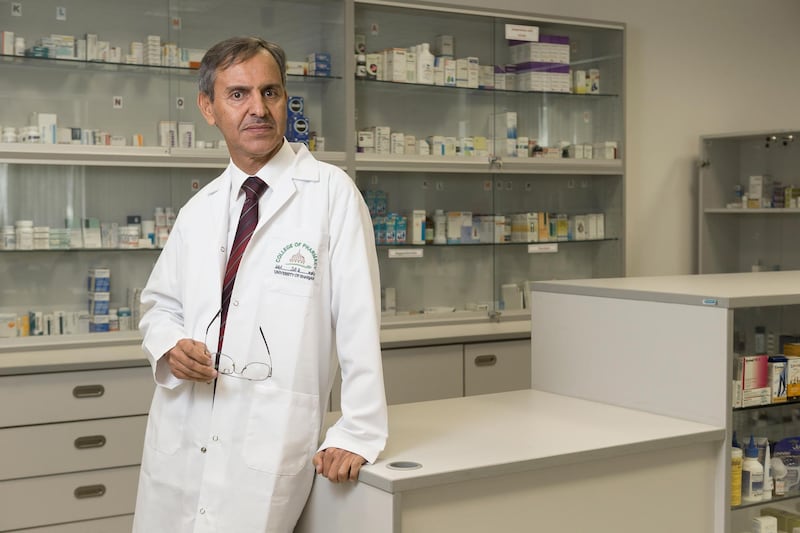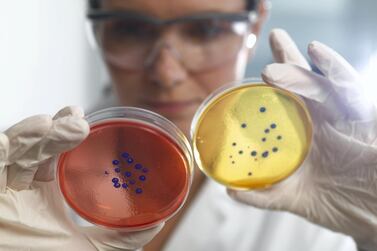Greater efforts are needed to tighten up on the sale of antibiotics, researchers have said, after a study highlighted high-rates of self-medication in the UAE.
The analysis found that in three in 10 cases where people had taken antibiotics, the drugs had not been prescribed.
Excessive use of antibiotics has become a major global concern because it results in the spread of forms of bacteria resistant to the drugs.
In the recent study, written by six researchers from the University of Sharjah, hundreds of Abu Dhabi, Dubai and Sharjah residents answered questions on their antibiotic use over a three-month period.
In total, 315 of the respondents had taken antibiotics during the period covered by the study and of these, 100 had taken them without a prescription, a proportion of 31.7 per cent.
The study's first author, Dr Abduelmula Abduelkarem, an associate professor of clinical pharmacy and pharmacy practice at the university, was surprised at the findings.
“It is a very high rate and this will add further support to the fact that we are moving towards the day where we will not find one proper antibiotic to treat our patients in our hospitals,” he said.
“If this practice becomes the norm, then we will end up with the available antibiotics not being capable of treating microbial infections of patients in our hospitals.”
The World Health Organisation (WHO) has warned that the spread of antibiotic resistance in bacteria is one of the biggest modern-day threats to global health and is making it harder to treat illnesses such as pneumonia and tuberculosis.
It is causing death rates to increase and if urgent action is not taken, the WHO has said that even minor injuries could prove fatal, as antibiotics might be unable to combat resulting infections.
Dr Abduelkarem said the self-medication rate identified in the new study was especially high, given efforts by the Ministry of Health and Prevention to restrict antibiotic sales.
In late 2017 the ministry announced a draft law banning the sale of antibiotics without prescription, and in May 2019 a senior official said the ministry's analysis showed a 43 per cent cut in antibiotic use.
Dr Abduelkarem said his results “may indicate that the message was not received as it should be”. Some people, he suggested, might be using leftover antibiotics kept at home, while high consultation fees might be encouraging self-medication.
“Physicians should be instructed not to respond to patient pressure and to only prescribe antibiotics when there is real need,” he said.
Doctors in multiple countries have reported feeling pressured into prescribing antibiotics, even when the drugs will be ineffective because the patient's infection is caused by a virus rather than bacteria.
Dr Abduelkarem said that awareness should be be raised among pharmacists too, so that they informed patients about “the serious drawbacks of the misuse of antibiotics”.
“Authorities should prohibit sales targets for profit, which is the goal of some pharmacy managers,” he said.
The study, entitled 'Prevalence of self-medication with antibiotics among residents in the United Arab Emirates', was published in the journal Infection and Drug Resistance. It had a relatively small sample size but follows research last year that suggested the strongest antibiotics are losing their potency on UAE patients.
A study in four Dubai hospitals of about 2,000 samples found carbapenems - regarded as a 'last resort' drug for seriously ill patients - showed reduced susceptibility in 23.9 per cent of cases.
Previous studies found resistance was even higher in other Arab states, including 41 per cent in Lebanon and 52 per cent in Saudi Arabia.
Despite the study's high self-medication rate, Dr Sameen Majid Matto, a specialist in internal medicine and endocrinology at the Canadian Specialist Hospital in Dubai, who was not connected to the research, said the UAE's law to ban antibiotic sales without prescription had had an effect.
“It has seriously put a dent in the amount of self-prescription and improper administration of the medicine,” he said.
“Of late, we have patients coming into the clinic just so they can have a prescription for an antibiotic, as the pharmacies didn't dispense without a prescription.”
However, he said that there was still a need to educate people about the dangers of self-medication, in case patients are able to obtain antibiotics.
“The results from the study show that the UAE is suffering from a problem that is prevalent in many other countries as well,” he said.
Last year, the Ministry of Health said it recorded a significant drop in antibiotic use in Abu Dhabi after banning pharmacies from handing out the drugs without a prescription.







